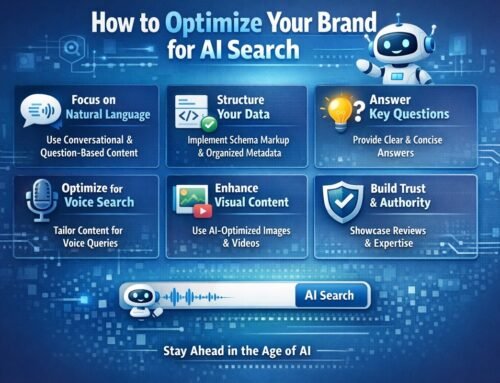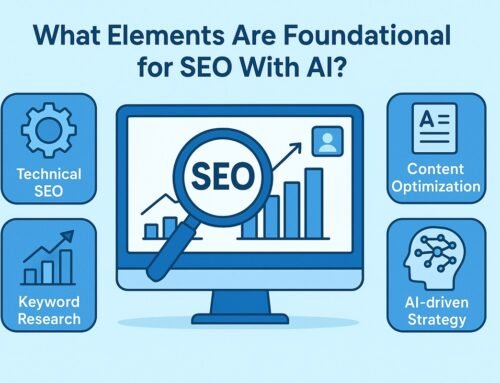The New Era of AI-Driven SEO
AI is no longer just a tool — it’s redefining how search engines work and how websites are ranked. With Google introducing AI Overviews (formerly SGE), search has become more intuitive, conversational, and context-based. Traditional SEO strategies focused on keywords and backlinks are evolving to include AI-driven content relevance, entity understanding, and user intent modeling.
This article explores how AI is transforming SEO, how to use it effectively, and how to ensure your website shows up in AI-generated results.
How to Use AI for SEO
AI offers a competitive edge for businesses, marketers, and bloggers looking to optimize their sites efficiently. From keyword research to content writing and analytics, AI automates and enhances every SEO process.
AI Tools for Keyword Research and Clustering
AI tools like Semrush AI Writing Assistant, Ahrefs Keywords Explorer, and ChatGPT can help you discover search intent clusters, semantic keywords, and trending topics — reducing manual analysis time significantly.
AI for Content Creation and Optimization
AI assists in drafting engaging outlines, detecting content gaps, and enhancing readability. Tools such as Jasper, SurferSEO, and Frase optimize content structure and keyword placement to align with ranking algorithms.
AI-Powered SEO Automation
Machine learning algorithms track ranking fluctuations, analyze competitors, and suggest improvements automatically. Platforms like RankIQ and MarketMuse leverage AI to predict what content will perform best.
AI in Link Building and Outreach
AI personalizes outreach messages, identifies link-worthy pages, and helps you build contextually strong backlinks using natural language processing (NLP).
How to Show Up in AI Overviews (SEO for AI Results)
Google’s AI Overviews provide summarized answers directly at the top of search results. To appear here, your content must demonstrate expertise, trustworthiness, and semantic precision.
Understanding Google’s AI Overview Algorithm
AI Overviews prioritize sources that deliver clear, concise, and reliable information supported by structured data and contextual relevance.
Content Quality and Semantic Relevance
Focus on topic clusters instead of single keywords. Cover every aspect of a subject to help AI models connect your content semantically.
Authority, E-E-A-T, and Context Signals
Use author bios, references, and real-world expertise to enhance Experience, Expertise, Authoritativeness, and Trustworthiness (E-E-A-T) signals.
Structured Data and Schema Markup
Implement FAQ, HowTo, and Article schema to help AI systems recognize and display your content accurately.
Optimizing Featured Snippets and FAQs
Since AI Overviews often pull from snippet-rich pages, structure your content in Q&A, list, or definition formats to increase inclusion chances.
Foundational Elements of SEO with AI
Despite AI’s rise, core SEO elements remain essential. AI amplifies their importance rather than replacing them.
Content Depth and Topical Authority
Build authority around topics by publishing in-depth, interlinked articles that cover every angle — a strategy AI now rewards more than ever.
Semantic Search and Intent Understanding
Focus on search intent — not just keywords. AI understands meaning, so aligning content tone and context with user expectations is key.
User Experience and Behavioral Metrics
Optimize for engagement. Metrics like time-on-page and interaction rate now influence AI relevance scoring.
Data-Driven On-Page Optimization
AI tools can recommend improvements in headings, internal links, and metadata for enhanced search alignment.
AI-Enhanced Technical SEO
Use AI to audit site structure, speed, and crawlability automatically, ensuring maximum search performance.
How AI Overviews Are Changing SEO
The AI revolution in search engines is redefining what “ranking” means.
Decline of Traditional Blue Links
AI-generated summaries often appear before organic results, reducing the visibility of traditional links.
Rise of Entities and Context
AI identifies and prioritizes entities — people, brands, or concepts — instead of just keywords.
Focus on Credibility and Source Trust
Citations from reliable sources and transparent authorship help content appear in AI Overviews.
Shift from Keywords to Topics
Topic-centric SEO ensures you rank for multiple related queries under AI’s contextual understanding.
How AI Overview Affects SEO for Blogging
Bloggers are among the first to experience AI-driven SEO shifts.
How Bloggers Can Stay Visible
Focus on unique insights, real experiences, and case studies — content AI cannot generate or summarize easily.
Building Brand Authority
Your brand must signal credibility across social media, backlinks, and author mentions.
Creating Original Research and Insights
Publishing exclusive data or personal expertise helps your blog stand out in AI-curated results.
Focusing on Reader Experience
Use visuals, infographics, and interactive content to encourage longer engagement — key for ranking longevity.
Future of SEO in the AI Era
SEO is shifting from a keyword game to an intent-driven, experience-focused ecosystem.
Expect more multimodal search integration (voice, image, video) and real-time AI interactions.
Success will depend on balancing automation with human creativity, authenticity, and ethical SEO practices.
Conclusion
AI is transforming SEO into a smarter, more personalized discipline. To thrive, businesses and bloggers must adapt quickly, combine AI insights with authentic expertise, and focus on user-first strategies. Those who embrace AI’s potential — instead of fearing it — will lead the next era of digital visibility.
FAQs about How AI Is Transforming SEO
What is AI Overview in Google Search?
AI Overview is Google’s AI-powered search feature that generates summarized answers from trusted web pages.
How can I make my website appear in AI Overviews?
Use structured data, provide expert-level content, and ensure your information is contextually rich and trustworthy.
Will AI replace SEO completely?
No, AI enhances SEO by automating research and improving accuracy, but human expertise and strategy remain vital.
How can bloggers use AI to improve SEO rankings?
By using AI tools for keyword discovery, content optimization, and SEO automation, bloggers can boost reach and efficiency.
What tools help optimize content for AI-driven search?
Tools like SurferSEO, MarketMuse, Frase, and ChatGPT help analyze intent, improve readability, and enhance ranking potential.




